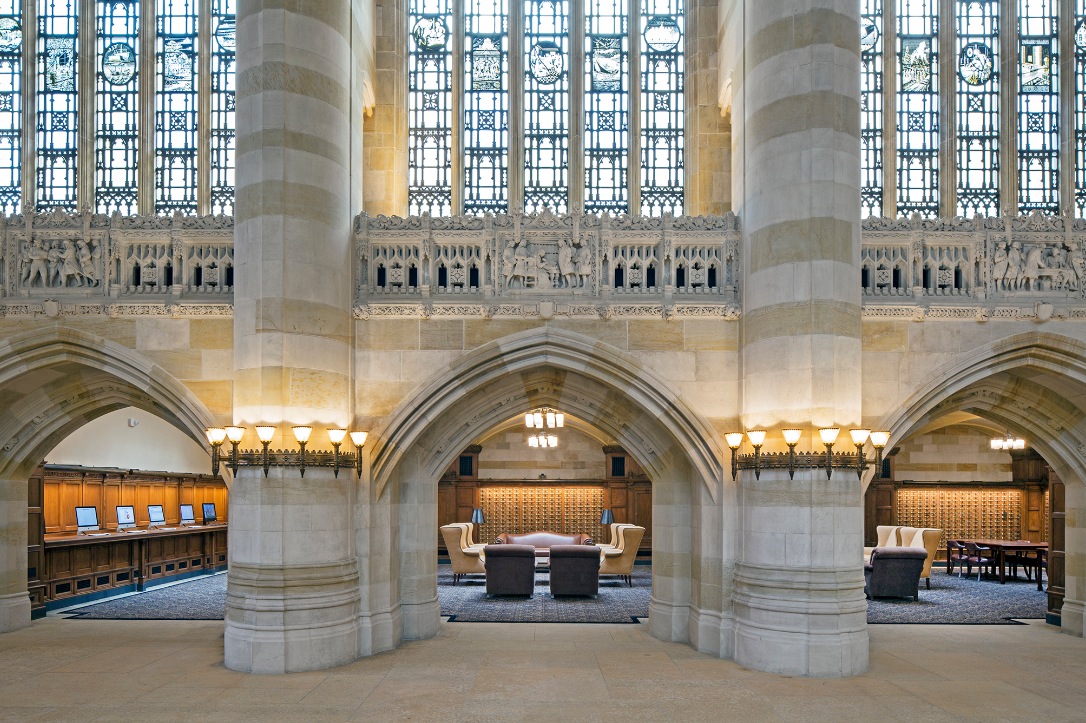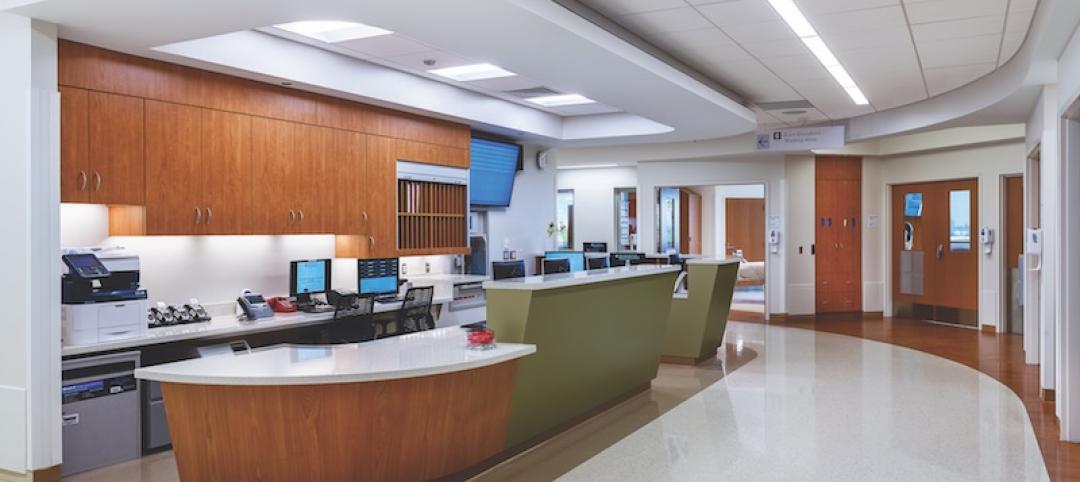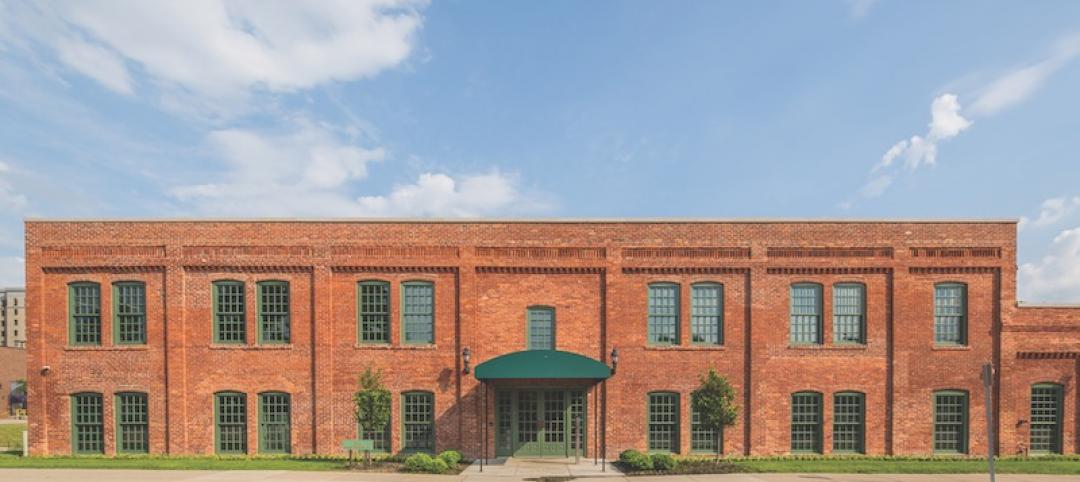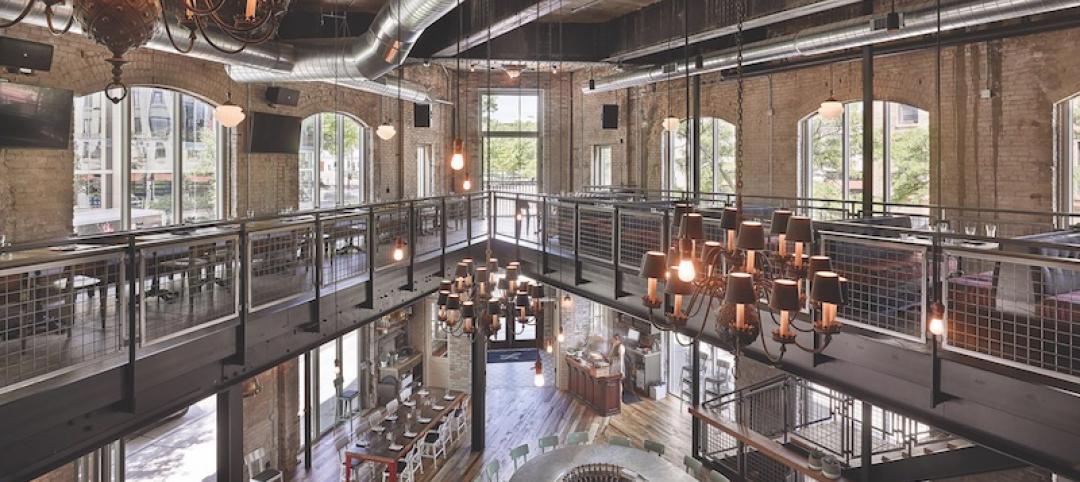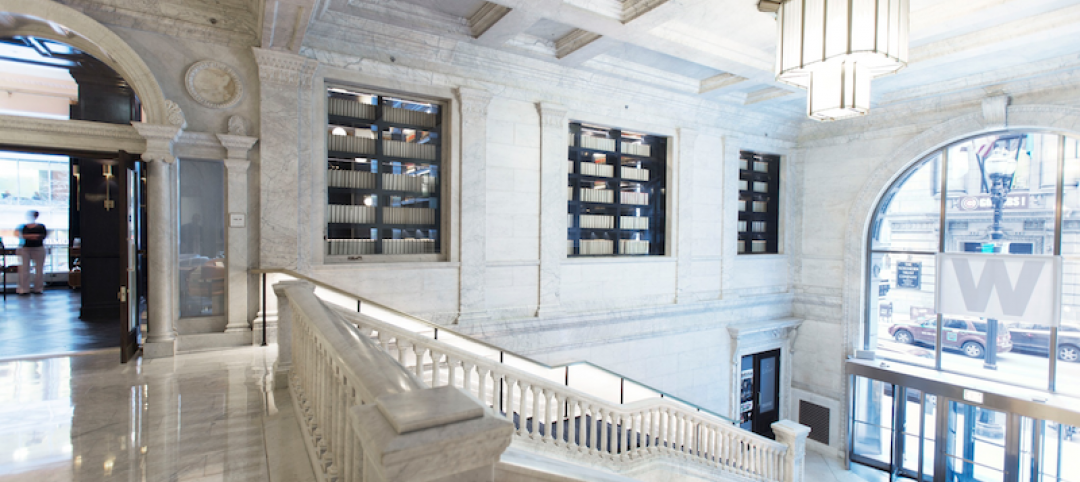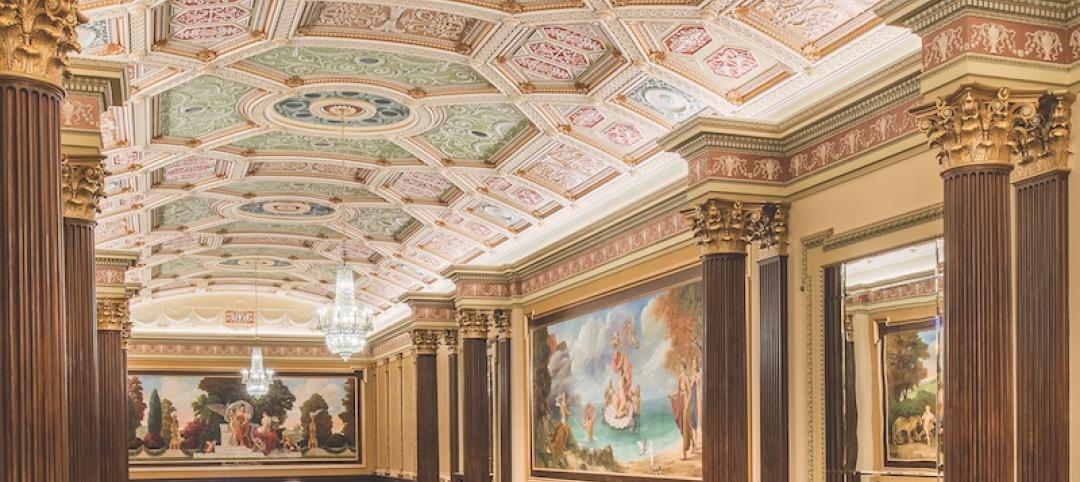When Yale University’s Sterling Library, designed by James Gamble Rogers (Class of 1889), opened in 1931, it was clear that the Collegiate Gothic structure had fulfilled the architect’s vision of a “temple of learning and a cathedral of knowledge.” The quasi-religious experience began right at the main entrance, the 150-foot-long nave, which was embellished with stained glass windows by G. Owen Bonawit, stone carvings by René P. Chambellan, and decorative ironwork by Samuel Yellin.
Four years ago, the university determined that the nave had suffered considerable deterioration and needed to be restored to its original condition. A Building Team led by Turner Construction Company and Helpern Architects was given a strict set of mandates: Make the new nave indistinguishable from the old. Take nothing away from the historic character of the original masonry, metal, finishes, painted surfaces, and stained glass. Improve library operations and update its technology to accommodate Sterling’s physical and digital collections.
SILVER AWARD
Sterling Memorial Library, Yale University New Haven, Conn.
Building Team
Submitting firms: Turner Construction Company (CM); Helpern Architects (architect)
Owner: Yale University
SE: Robert Silman Associates
MEP engineer: AKF Group
Acoustics/AV: Jaffe HoldenGeneral Information
Size: 13,000 sf
Construction cost: $13.5 million
Construction time: June 2013 to August 2014
Delivery method: CM at risk
These tasks were complicated by the further requirement to modernize the nave’s MEP systems—upgrading the lighting to current standards, inserting air-conditioning, concealing the fire alarm system, etc. This had to be accomplished without disturbing the load-bearing stone walls, piers, and columns, which offered no room to incorporate pipes, conduit, and other key infrastructure.
Without any existing cavity wall or chase wall spaces in which to route new mechanical services, the Building Team had to figure out how to jam in critical infrastructure anywhere it could while preserving the existing architectural elements.
Early in the design phase, Turner suggested moving the proposed new mechanical room from its original position in the library stack to unused attic space. The CM hung an aluminum catwalk system from the wood roof framing and created a temporary opening in the stone façade just large enough to fit the air-handling unit. Mechanical piping was installed by opening the roof and craning new risers in from above, the risers running the full length of the shaft.
The last piece of the MEP puzzle had to do with the new fan coil units. Millwork subcontractor CW Keller & Associates created a system of hidden doors within the existing millwork that concealed the fan coil units while maintaining the historic appearance of the card catalog fixtures.
With the MEP matter behind them, the Building Team attacked the remaining problems. Femenella & Associates, working with Helpern Architects, restored the Bonawit stained glass windows. Kugler Ning Lighting Design installed new LED lighting to brighten the interior. The architect reorganized the functions of the three service desks into a single unit, created small meeting spaces in the nave’s north aisle, and reconfigured the circulation desk for easier entry to the stacks.
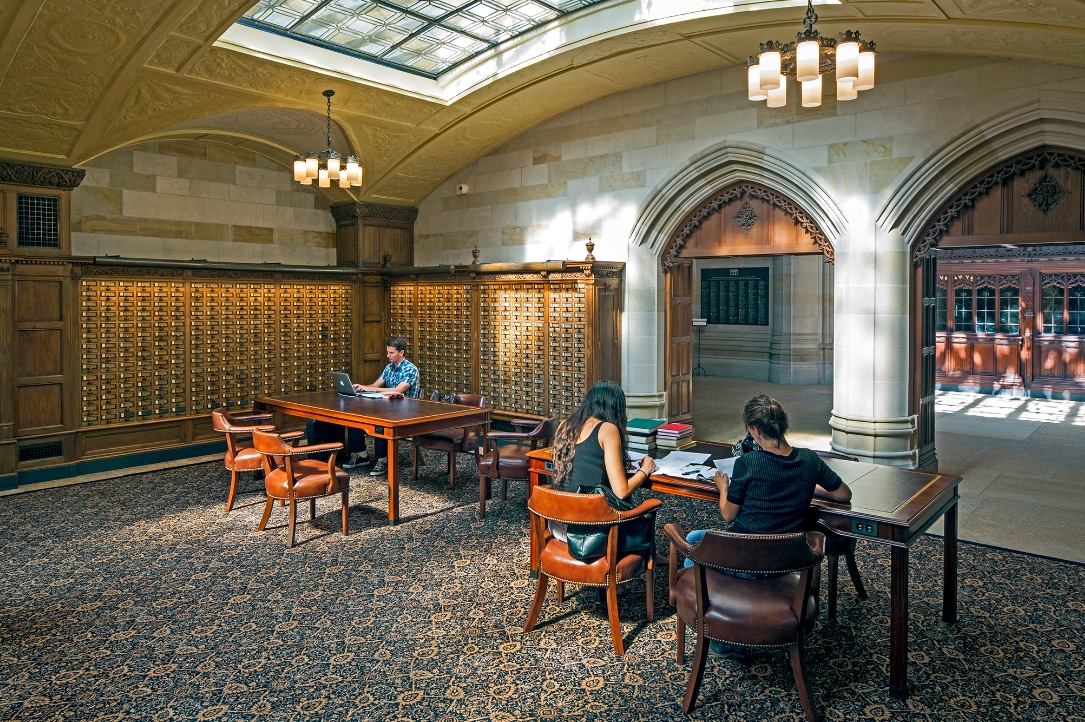 Sterling Memorial Library, originally designed by Yale alumnus James Gamble Rogers, opened in 1931. The Alma Mater mural rises at the end of the 150-foot-long nave (below). Twenty-seven original stained glass windows by G. Owen Bonawit in the nave were restored. Photos: Brian Rose.
Sterling Memorial Library, originally designed by Yale alumnus James Gamble Rogers, opened in 1931. The Alma Mater mural rises at the end of the 150-foot-long nave (below). Twenty-seven original stained glass windows by G. Owen Bonawit in the nave were restored. Photos: Brian Rose.
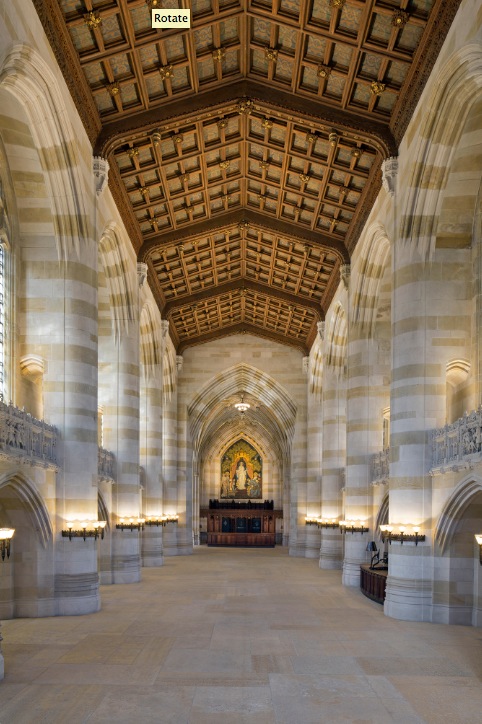
Related Stories
Reconstruction Awards | Nov 27, 2017
Patient friendly: The University of Chicago Medicine Center for Care and Discovery adds 203 new beds
Strict infection control and life safety measures were implemented to protect patients on other floors as work proceeded.
Reconstruction Awards | Nov 27, 2017
The birthplace of General Motors
The automotive giant salvages the place from which it sprang, 131 years ago.
Reconstruction Awards | Nov 21, 2017
Mama mia! What a pizzeria!: It started as a bank nearly a century ago, now it’s a pizza parlor with plenty of pizzazz
The first floor features a zinc bar and an authentic Neapolitan pizza oven.
Reconstruction Awards | Nov 21, 2017
Honor Guard: San Francisco’s historic Veterans Building pays homage to those who served in World War I and other foreign wars
The Veterans Building houses the War Memorial staff, the city’s Arts Commission, the Opera’s learning center and practice/performance node, the Green Room reception venue, and the 916-seat Herbst Theatre.
Reconstruction Awards | Nov 20, 2017
Eyes wide open: Students can see their new home’s building elements
The two-phase project revamped an opaque, horseshoe-shaped labyrinth of seven buildings from the ’60s and ’70s.
Reconstruction Awards | Nov 17, 2017
Gray lady no more: A facelift erases a landmark’s wrinkles, but not her heritage
The Building Team restored the granite and terra cotta façade and reclaimed more than 500 double-hung windows.
Reconstruction Awards | Nov 17, 2017
Elegance personified: New life for a neglected but still imposing retail/office space
The building was in such disrepair that much of the reconstruction budget had to go toward structural, mechanical, and electrical infrastructure improvements.
Reconstruction Awards | Nov 16, 2017
Back to the '20s: Coney Island gets a new eatery reminiscent of the past
This project included the restoration of the landmark Childs Restaurant.
Reconstruction Awards | Nov 15, 2017
Foyer fantastique: Faded images provide the key to a historic theater's lobby restoration
The restoration relied heavily on historic photos and drawings.
Reconstruction Awards | Nov 14, 2017
Hallowed ground: A Mormon temple rises from the ashes of a fire-ravaged historic tabernacle
Parts of the tabernacle’s exterior shell were the only things that survived the blaze.


